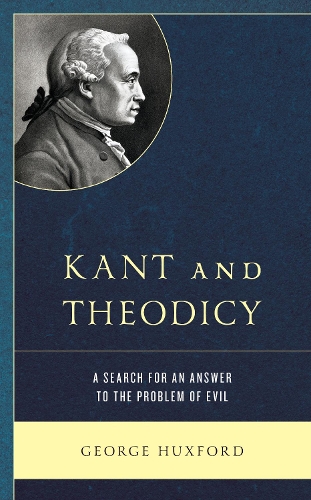
Kant and Theodicy: A Search for an Answer to the Problem of Evil
(Paperback)
Available Formats
Publishing Details
Kant and Theodicy: A Search for an Answer to the Problem of Evil
By (Author) George Huxford
Bloomsbury Publishing PLC
Lexington Books
4th March 2022
United States
Classifications
Professional and Scholarly
Non Fiction
History of ideas
Theology
193
Physical Properties
Paperback
172
Width 154mm, Height 219mm, Spine 13mm
268g
Description
In Kant and Theodicy: A Search for an Answer to the Problem of Evil, George Huxford proves that Kants engagement with theodicy was career-long and not confined to his short 1791 treatise that dealt explicitly with the subject. Huxford treats Kants developing thought on theodicy in three periods: pre-Critical (exploration), early-Critical (transition), and late-Critical (conclusion). Illustrating the advantage of approaching Kant through this framework, Huxford argues that Kants stance developed through his career into his own unique authentic theodicy; Kant rejected philosophical theodicies based on theoretical/speculative reason but advanced authentic theodicy grounded in practical reason, finding a middle ground between philosophical theodicy and fideism, both of which he rejected. Nevertheless, Huxford concludes that Kants authentic theodicy fails because it fails to meet his own definition of a theodicy.
Reviews
Kant and Theodicy is essential reading for specialists on Kant's religious views and their development.
* Journal of the History of Philosophy *In fewer than 150 pages, Huxford lays out an admirably clear and surprisingly comprehensive account of Immanuel Kants career-long engagement with the problem of theodicy, defined by Kant in his 1791 essay "On the Failure of All Philosophical Efforts in Theodicy" as the defense of the highest wisdom of the creator against the charge which reason brings against it for whatever is counter-purposive in the world (quoted on p. xii)in other words, the defending of Gods cause in the face of evil. Though many Kant readers will be familiar, at least by title, with this essay, Huxford demonstrates in detail that Kant was concerned with theodicy from his very earliest, pre-critical writings (in which his focus is on the theodicies of Leibniz and Pope) and that his interest continued on through the early and late critical periods, coming to fruition in "Failure." Students of Kant will benefit from this synopsis of the course of Kants philosophical progress, and readers interested in theodicy will appreciate the many insights afforded by Kants work into the taxonomy of evil and the possibility and conditions of a successful theodicy. Summing Up: Recommended. Upper-division undergraduates through faculty.
* Choice *"From its examination of Kants pre-Critical views to the 1791 distinction between doctrinal and authentic theodicy, Kant and Theodicy does an excellent job documenting salient passages, exploring the secondary literature, and evaluating how Kants views on theodicy interact with the major elements of his theoretical and practical philosophy. This is a must-read for specialists in Kants philosophy of religion and will be of interest to philosophers and theologians alike working on the problem of evil. " -- Lawrence Pasternack, Oklahoma State University
"This is a welcome book-length effort to depict Kants decades-long struggle with questions about evil and theodicy. Huxford offers a sympathetic portrayal of Kants evolving views about evil and convincingly argues that they are much more central to his philosophical project than often recognized." -- Andrew Chignell, University Center for Human Values at Princeton University
"Thanks to George Huxfords masterful overview of the (much-neglected) attention Kant devoted, throughout his corpus, to philosophical problems relating to theodicy, responsible Kant scholars can no longer portray Kant as having a merely passing interest in the problem of evil. Instead, by showing how Kants 1791 essay culminates his lifelong grappling with God and evil, Huxfords analysis makes it seem only natural that Kant turned to theodicy as soon as he completed the third Critique. This comprehensive study is essential reading not only for those interested in the history of theodicy but for anyone who seeks to understand Kant holistically." -- Stephen R. Palmquist, Hong Kong Baptist University
Author Bio
George Huxford received his PhD from Kings College in London.
